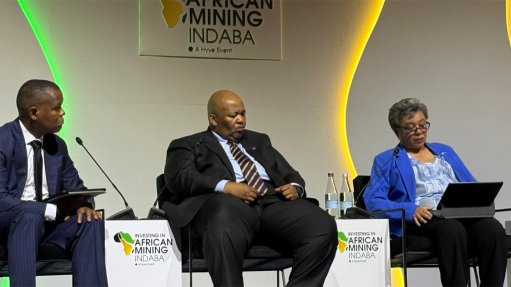Potential of biogas technology in South Africa
The National Cleaner Production Centre South Africa's Tanya van Zyl argues that biogas power generation in South Africa – where agriculture is a key economic activity in all nine provinces – presents a strong business case
The uptake of biogas projects in Africa has been sporadic, and projects that have failed abound. Biogas technology is not new, but the systems are sensitive and changes in, and the availability of, feedstock create challenges. The technology is, however, well suited to the African and South African contexts, specifically. In South Africa, biogas has the potential to displace 2 500 MW of grid electricity, equivalent to the size of Eskom’s Arnot coal-fired power station, in Mpumalanga, which was commissioned in 1975.
Biogas is produced from the decomposition of organic waste. Early lessons from failed biogas installations, both abroad and at home, serve as a timely and expensive reminder that construction shortcuts and simply transposing foreign methodologies and designs will not be sustainable. Biogas feedstock options in South Africa differ vastly from options in developed countries, where maize silage, ground cereal, rape and rye seeds are commonly used as feedstock. Waste sources in South Africa include food scraps, animal waste – including chicken, cow and pig manure – as well as numerous other agricultural wastes. It is also clear that there is an opportunity here for landfill gas, municipal waste and other waste types. The gas that is released from the decomposition is a blend of primarily methane and carbon dioxide (CO2).
When you consider that South Africa accounts for about 1.1% of global greenhouse-gas emissions, that emissions increased by 24.9% between 2000 and 2010, that in excess of 40-million tonnes of biomass and organic waste is generated each year, that agriculture is a key activity in all the country's nine provinces and that energy costs have spiraled beyond 300% in eight years, then renewable energy – and biogas power generation, in particular – presents a strong business case.
The prevailing favourable biogas feed-in tariff and a slew of recent environmental legislation conducive to the establishment of biogas plants – namely the National Environmental Management Act, the National Environmental Management: Waste Act, the National Environmental Management: Air Quality Act, the National Waste Management Strategy and the Income Tax Act Amendment 12L (Cleaner Development Mechanism) – serve to create conditions that stimulate local interest and attract foreign biogas producers to our market. The formation of the Southern Africa Biogas Industry Association further underscores how seriously the growth of the biogas industry in South Africa is anticipated.
Benefits of the technology include a reduction in the amount of methane that is released into the atmosphere from the decomposition of waste lesser reliance on fossil fuels. Methane, as a GHG, has a heat-trapping capability that is 20 to 30 times that of CO2. An additional benefit of the technology to South Africa is that waste sources are available in rural areas, which means that it may create jobs in these areas. The gas generated can also be used by local communities for cooking.
Waste is converted into biogas in digesters, which usually have a digestion chamber in which the gas is collected. Gas is collected and a nutrient-rich sludge is generated that can be used as a liquid fertiliser. This fertiliser can be drained regularly. Further, a slurry is generated and usually emptied out of the bottom of the digester only once or twice a year. The slurry is nutrient dense and can benefit soil and increase the productivity of vegetable gardens.
Some of the clear and obvious benefits of biogas are:
* employment creation;
* landfill diversion;
* a reduction in waste disposal costs;
* diesel substitution in buses, trucks and taxis by purified biogas (600 Johannesburg taxis are powered by compressed natural gas);
* satisfying a growing cogeneration demand; and
* the aeration and addition of magnesium and phosphates to depleted disgestate produces fertiliser and compost.
A key challenge in South Africa is the fact that there is simply no generic feedstock solution. You cannot simply transpose a biogas technology from one continent, country or region to another, as local climatic conditions and the availability and proximity of feedstock strongly influence the design of the digester, agitators and the anaerobic technology that is employed (batch reactor versus continuous reactor, mesophyllc digestion versus thermophyllic digestion and digester temperature) which require extensive testing before the correct method, technology and feedstock mix are determined.
In line with its mandate of helping South Africa transition to a lower-carbon economy, the National Cleaner Production Centre South Africa (NCPC-SA) has decided to develop a course on small-scale agricultural and small-scale commercial biogas project development. As with all the NCPC-SA’s courses, this course will kick off with a theoretical component and will have a long practical component, during which candidates will be mentored through the process of them developing their own biogas project.
In addition to the traditional final report submission and exam, a funding workshop will be held at the end of the course to give funders of renewable-energy projects the opportunity to step in and help move these projects towards implementation by providing funding. During the course of 2019, the NCPC-SA garnered the support of farmers and youth in Mpumalanga and hopes to run the first round of the biogas course in this province in 2020.
* Van Zyl is quality assurance manager at NCPC-SA
Article Enquiry
Email Article
Save Article
Feedback
To advertise email advertising@creamermedia.co.za or click here
Press Office
Announcements
What's On
Subscribe to improve your user experience...
Option 1 (equivalent of R125 a month):
Receive a weekly copy of Creamer Media's Engineering News & Mining Weekly magazine
(print copy for those in South Africa and e-magazine for those outside of South Africa)
Receive daily email newsletters
Access to full search results
Access archive of magazine back copies
Access to Projects in Progress
Access to ONE Research Report of your choice in PDF format
Option 2 (equivalent of R375 a month):
All benefits from Option 1
PLUS
Access to Creamer Media's Research Channel Africa for ALL Research Reports, in PDF format, on various industrial and mining sectors
including Electricity; Water; Energy Transition; Hydrogen; Roads, Rail and Ports; Coal; Gold; Platinum; Battery Metals; etc.
Already a subscriber?
Forgotten your password?
Receive weekly copy of Creamer Media's Engineering News & Mining Weekly magazine (print copy for those in South Africa and e-magazine for those outside of South Africa)
➕
Recieve daily email newsletters
➕
Access to full search results
➕
Access archive of magazine back copies
➕
Access to Projects in Progress
➕
Access to ONE Research Report of your choice in PDF format
RESEARCH CHANNEL AFRICA
R4500 (equivalent of R375 a month)
SUBSCRIBEAll benefits from Option 1
➕
Access to Creamer Media's Research Channel Africa for ALL Research Reports on various industrial and mining sectors, in PDF format, including on:
Electricity
➕
Water
➕
Energy Transition
➕
Hydrogen
➕
Roads, Rail and Ports
➕
Coal
➕
Gold
➕
Platinum
➕
Battery Metals
➕
etc.
Receive all benefits from Option 1 or Option 2 delivered to numerous people at your company
➕
Multiple User names and Passwords for simultaneous log-ins
➕
Intranet integration access to all in your organisation


















